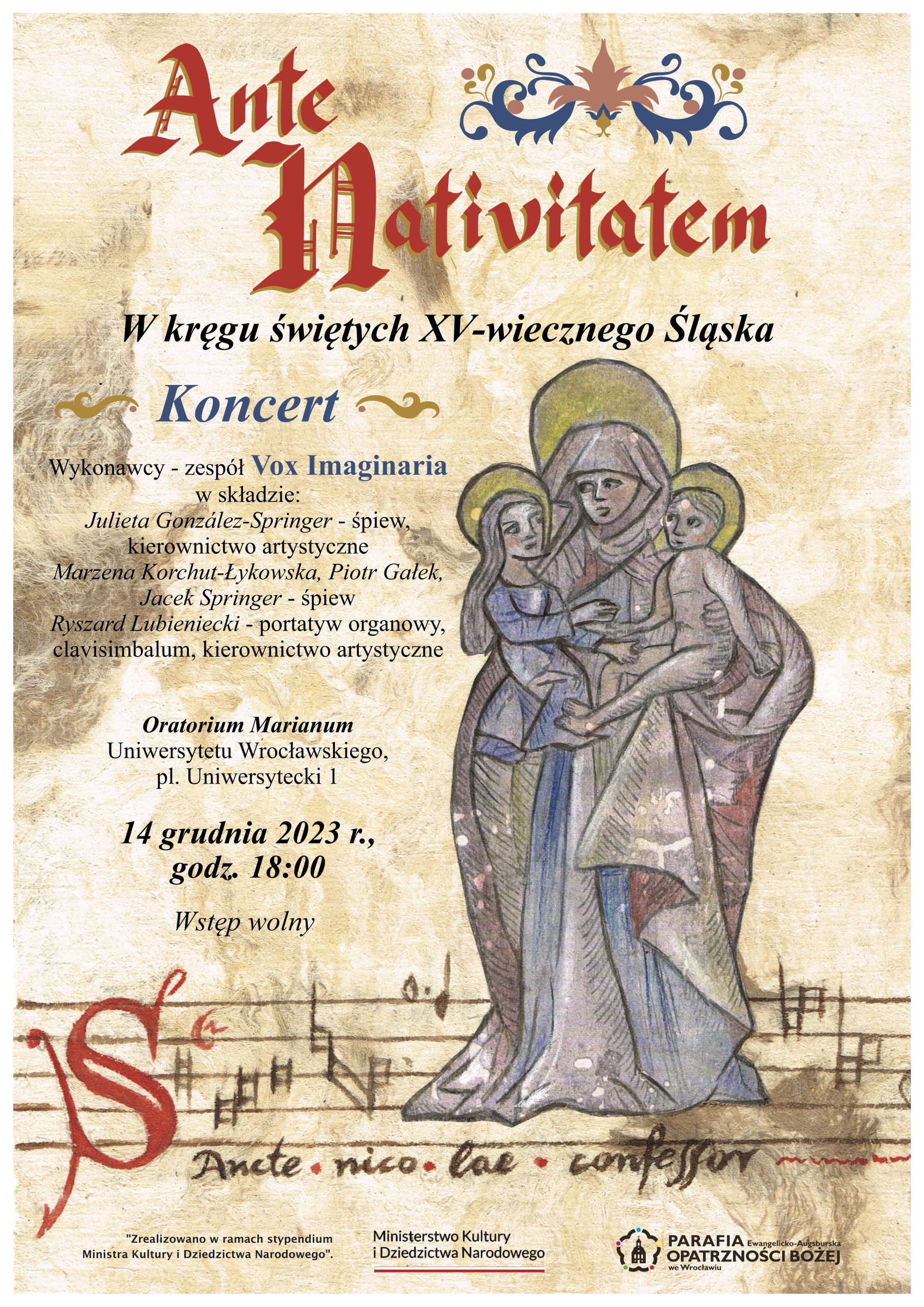Medieval Silesia (stretching from the present-day southwestern voivodeships all the way to the Lubuskie voivodeship) is an extremely important area for early music researchers and performers. A number of treaties and a rich repertory of musical works, which is both a testimony to Western and local influences, have survived to the present day. These are mostly religious pieces, which reflect life in the monasteries of that time and were intended to reach the local community of believers. It comes as no surprise that the surviving pieces often refer to local saints, tell stories about their lives, and set them as examples to follow.
The concert Ante Nativitatem. W kręgu świętych XV-wiecznego Śląska. (Ante Nativitatem. Saints of interest in 15th-century Silesia.) will be focused on this very music. Following the liturgical calendar, we will focus on the figures of those saints whose memorials occur in the second half of the year. We will begin with the part dedicated to St. Martin. St. Martin’s memorial, according to tradition, is associated not only with church services, but also with feasting. Out of the three sections, the middle one is thematically less unified. It is about “all the saints” (de omnibus sanctis), among whom St. Catherine, Margaret, Michael and Gregory will appear. The last section is dedicated to the “saints of December”, St. Barbara and St. Nicholas, who will redirect our attention straight to Christmas. The concert will be an opportunity to hear works that are rarely performed, but are extremely interesting. In particular, we will hear polyphonic compositions from the “Partesy Żagańskie” manuscript (also known as the Glogauer Liederbuch) and (mostly) single-voice compositions from the “Kancjonał Średzki” hymnal, which is a manuscript containing the repertoire sung by students of the parish school in Środa Śląska of the second half of the 15th century. The program will be accompanied by instrumental compositions and improvisations performed on ancient keyboard instruments – the portativo organ (the smallest type of pipe organ) and the clavisimbalum (predecessor not only to later harpsichords, but also to pianos).
The music group giving a concert is Vox Imaginaria, composed of:
Julieta González-Springer – vocals, artistic direction
Marzena Korchut-Łykowska, Piotr Gałek, Jacek Springer – vocals
Ryszard Lubieniecki – portative organ, clavisymbalum, artistic direction
Free admission
The concert is part of the project „Wizje świętych w religijnym repertuarze muzycznym średniowiecznego Śląska” (“Visions of the Saints in the Religious Musical Repertoire of Medieval Silesia”) which is being carried out as a result of an art scholarship from the Ministry of Culture and National Heritage received by Julieta González-Springer.
Vox Imaginaria
The core of the Vox Imaginaria group is Julieta González-Springer and Ryszard Lubieniecki, who are performers specializing in medieval music. They began working together in early 2019, looking for compositions that could be performed with a limited lineup of voice and portative organ only. Their repertory includes music from almost all regions of medieval Europe: from the Iberian Peninsula to historic Silesia. Both are affiliated with the Institute of Musicology at the University of Wrocław. Members of the Vox Imaginaria group have studied with prominent early music performers (including Marcel Pérès, Katarina Livljanić, Laurence Brisset, Benjamin Bagby, Patrizia Bovi and Corina Marti) and participated in projects (Formations Professionnelles) organized by the Royaumont Foundation. They collaborate with various institutions, including the Obszar Wspólny foundation (the Common Area Foundation), Sztukupuku and Macondo foundations, Księgarnia Hiszpańska (the Spanish Bookstore), Alliance Française, and the Institute of Romance Studies at the University of Wrocław, spreading knowledge of medieval music in the form of concerts and workshops. They invite Wrocław musicians to collaborate on their latest projects, which allows the group’s repertory to progress.
Translated by Karolina Szmidla (student of English Studies at the University of Wrocław) as part of the translation practice.




